外研版初中英语时态精细讲解
- 格式:ppt
- 大小:2.98 MB
- 文档页数:30
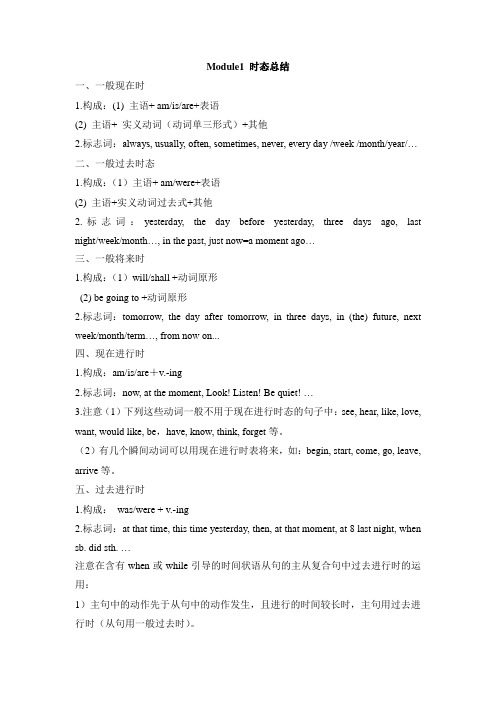
Module1 时态总结一、一般现在时1.构成:(1) 主语+ am/is/are+表语(2) 主语+ 实义动词(动词单三形式)+其他2.标志词:always, usually, often, sometimes, never, every day /week /month/year/…二、一般过去时态1.构成:(1)主语+ am/were+表语(2) 主语+实义动词过去式+其他2.标志词:yesterday, the day before yesterday, three days ago, last night/week/month…, in the past, just now=a moment ago…三、一般将来时1.构成:(1)will/shall +动词原形(2) be going to +动词原形2.标志词:tomorrow, the day after tomorrow, in three days, in (the) future, next week/month/term…, from now on...四、现在进行时1.构成:am/is/are+v.-ing2.标志词:now, at the moment, Look! Listen! Be quiet! …3.注意(1)下列这些动词一般不用于现在进行时态的句子中:see, hear, like, love, want, would like, be,have, know, think, forget等。
(2)有几个瞬间动词可以用现在进行时表将来,如:begin, start, come, go, leave, arrive等。
五、过去进行时1.构成:was/were + v.-ing2.标志词:at that time, this time yesterday, then, at that moment, at 8 last night, when sb. did sth. …注意在含有when或while引导的时间状语从句的主从复合句中过去进行时的运用:1)主句中的动作先于从句中的动作发生,且进行的时间较长时,主句用过去进行时(从句用一般过去时)。

外研版英语九年级上册Module1语法点6种时态的区分6种时态的区分The Simple Present Tense一般现在时一.什么时候用一般现在时?一般现在时用于表示现在的状态,如:He is twelve./She is at work./My father is a doctor.表示经常的或习惯性的动作,通常与副词always,usually,often,sometimes,seldom,three times a day, every day(week,month---)等表示频度的时间状语联用如:I get up at 6:30 every day. 表示主语具备的性格和能力等,如:She likes noodles. / They speak French.表示客观事实或真理,如:The sun rises from the east and set in the west.二.一般现在时的构成。
1. be动词。
在一般现在时中be动词有三种形式:am, is, are. 其中am只用于主语是I的情况;主语是第三人称单数用is;其他人称用are。
第一人称:指“我”、“我们”,即I,we。
第二人称:指“你”、“你们”,即you。
第三人称:除第一、二人称外都是第三人称,名词都是第三人称。
第三人称单数:包括代词he,she,it,可数名词单数和不可数名词做主语时都是第三人称单数做主语。
第三人称复数:包括代词they,可数名词两个或两个以上为复数,不可数名词没有复数形式。
如:I am a student. You are 11 years old. He is at work. She is a Japanese girl.It is fine today. They are from Korea.2.如果谓语动词不用be动词。
那么,当句子的主语为第一人称、第二人称或第三人称复数时,在肯定句中,谓语动词用原形。
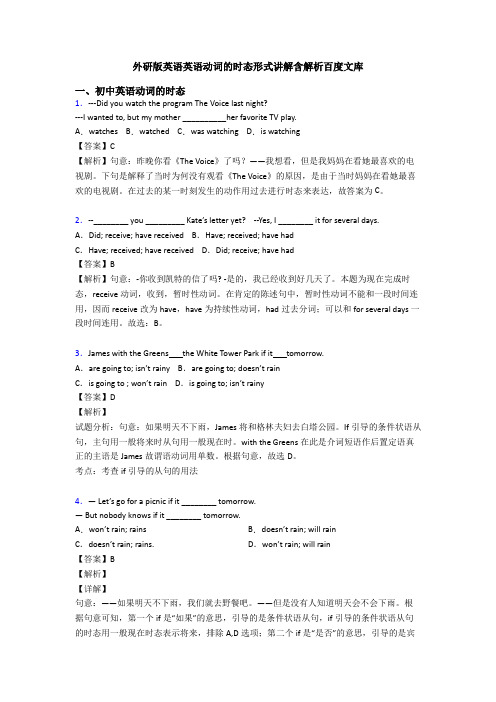
外研版英语英语动词的时态形式讲解含解析百度文库一、初中英语动词的时态1.---Did you watch the program The Voice last night?---I wanted to, but my mother __________her favorite TV play.A.watches B.watched C.was watching D.is watching【答案】C【解析】句意:昨晚你看《The Voice》了吗?——我想看,但是我妈妈在看她最喜欢的电视剧。
下句是解释了当时为何没有观看《The Voice》的原因,是由于当时妈妈在看她最喜欢的电视剧。
在过去的某一时刻发生的动作用过去进行时态来表达,故答案为C。
2.--________ you _________ Kate’s letter yet? --Yes, I ________ it for several days. A.Did; receive; have received B.Have; received; have hadC.Have; received; have received D.Did; receive; have had【答案】B【解析】句意:-你收到凯特的信了吗? -是的,我已经收到好几天了。
本题为现在完成时态,receive动词,收到,暂时性动词。
在肯定的陈述句中,暂时性动词不能和一段时间连用,因而receive改为have,have为持续性动词,had过去分词;可以和for several days一段时间连用。
故选:B。
3.James with the Greens the White Tower Park if it tomorrow.A.are going to; isn’t rainy B.are going to; doesn’t rainC.is going to ; won’t rain D.is going to; isn’t rainy【答案】D【解析】试题分析:句意:如果明天不下雨,James将和格林夫妇去白塔公园。

外研版初二上英语知识点时态篇一.主要时态1. 当有always, usually , often, sometimes, seldom, never, once a,every 时用一般现在时态。
时态构成:Be 动词或行为动词主语为第三人称单数时:动词用第三人称单数式(is、has、v+s/es);主语为一、二人称时动词用原形。
否定形式:be 动词(am、is、are)+not行为动词前+don't 主语为第三人称单数+doesn't 同时把行为动词还原成原形形式一般疑问句:be 提前2. 当有now,at the moment,look,listen 时用现在进行时态。
时态构成:Be(am,is ,are)+v-ing3. 当有Tomorrow,the day after tomorrow , from nowon,in+ —段时间,some day, next 时用一般将来时态。
时态构成为:will+v. 或be going to+v.4. 当有yesterday, ago,last ,just now 用一般过去时时态构成:v.+ed二.重要时态1. 一般现在时:时态含义:表示经常性、习惯性的动作、状态。
时态使用场合:( 1 )表示经常习惯的行为状态Nick doesn 'tdo his homework on Sundays.I go to school by bus everyday.(2)表示普遍真理和客观事实。
Beijing lies in the east of China.The sun rises from the east.(3)用于时间及条件状语从句中。
用于时间状语从句中(when、while、before> after、until、as soon as等引导):I will phone you as soon as i get home. 用于条件状语从句中:If you smile to the world,the world will smile back.If you are a tear in my eye,i will never cry.(4)用于时间表中:如列车时刻表、航班出发时间表。

外研版九年级上册英语语法总结外研版九年级上册英语语法总结一、动词时态1、现在完成时:表示过去发生的动作对现在造成的影响或结果。
基本结构为“have/has + 过去分词”,例如:I have just finished my homework.2、现在完成进行时:表示过去开始的动作到现在仍在继续。
基本结构为“have/has been + 过去分词”,例如:We have been waiting for you for a long time.二、被动语态1、基本结构:be + 过去分词,例如:The book is written by Charles Dickens.2、常用时态:一般现在时、一般过去时、一般将来时、现在进行时、现在完成时、过去进行时、过去完成时、过去将来时。
三、情态动词1、基本用法:情态动词后接动词原形,表示推测、可能、必要等意义。
常见的情态动词有can、may、must、should等。
2、特殊用法:情态动词后接“have + 过去分词”,表示推测、可能、必要等意义。
例如:You must have misunderstood me.四、定语从句1、基本用法:在句子中,定语从句用来修饰主语、宾语或表语。
引导定语从句的有that、which、who等。
2、难点解析:如何判断定语从句的引导词,根据定语从句与先行词的关系以及定语从句在句子中的作用来决定。
五、状语从句1、时间状语从句:用来表达动作发生的时间,例如:When the sun sets,we will go home.2、条件状语从句:用来表达某个条件下的结果,例如:If it rains tomorrow,we will stay at home.3、原因状语从句:用来表达原因或理由,例如:Because he was late,he missed the train.六、名词性从句1、主语从句:在句子中作主语,例如:What they need is more time.2、宾语从句:在句子中作宾语,例如:He told me that he would comeback soon.3、表语从句:在句子中作表语,例如:The reason why he left is unclear.以上是外研版九年级上册英语语法的主要内容,同学们在学习过程中要注意理解语法规则的基本含义和用法,多加练习,提高自己的英语语言能力。
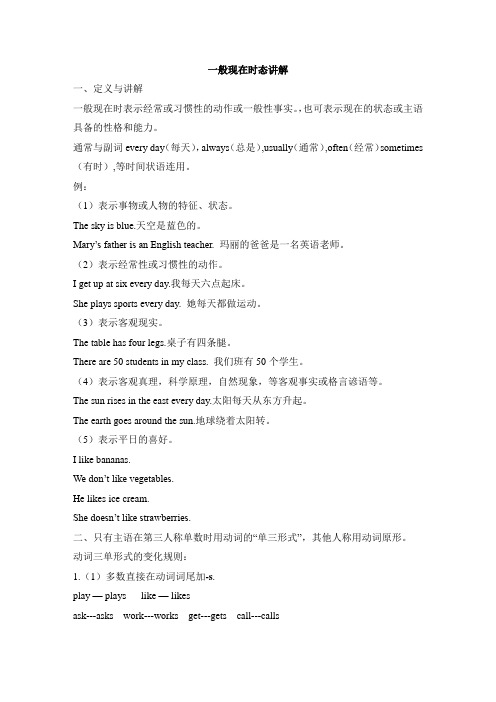
一般现在时态讲解一、定义与讲解一般现在时表示经常或习惯性的动作或一般性事实。
,也可表示现在的状态或主语具备的性格和能力。
通常与副词every day(每天),always(总是),usually(通常),often(经常)sometimes (有时),等时间状语连用。
例:(1)表示事物或人物的特征、状态。
The sky is blue.天空是蓝色的。
Mary’s father is an English teacher. 玛丽的爸爸是一名英语老师。
(2)表示经常性或习惯性的动作。
I get up at six every day.我每天六点起床。
She plays sports every day. 她每天都做运动。
(3)表示客观现实。
The table has four legs.桌子有四条腿。
There are 50 students in my class. 我们班有50个学生。
(4)表示客观真理,科学原理,自然现象,等客观事实或格言谚语等。
The sun rises in the east every day.太阳每天从东方升起。
The earth goes around the sun.地球绕着太阳转。
(5)表示平日的喜好。
I like bananas.We don’t like vegetables.He likes ice cream.She doesn’t like strawberries.二、只有主语在第三人称单数时用动词的“单三形式”,其他人称用动词原形。
动词三单形式的变化规则:1.(1)多数直接在动词词尾加-s.play — plays like — likesask---asks work---works get---gets call---calls(2)以字母s, x, ch, sh或o结尾的动词,在词尾直接加-es.watch---watches wish---wishes do---does go---goes(3)以“辅音字母加- y”结尾的动词,要先变y为i再加-es.try---tries study---studies cry---cries fly---flies2.不规则变化:be---- is have----has三、一般现在时的句子转换:(1)变一般疑问句:当句子中有be动词或情态动词时,则把be动词或情态动词(can, could等)提到主语的前面,(口诀:一调二变三问号);(2)变否定句:在be动词或情态动词后面直接加not变成否定句. (be后not莫忘记)例:①陈述句:She is my sister.疑问句→ Is she your sister? Yes,I am. / No, I’m not.否定句→ She is not my sister.②陈述句:I can play soccer.疑问句→ C an you play soccer? Yes, I can. / No, I can’t.否定句→ I can’t play soccer.注意:对一般疑问句的回答:一般用什么问就用什么来回答。

外研社版九年级英语知识点一、动词时态动词时态主要分为以下几种:一般现在时、一般过去时、一般将来时、现在进行时、过去进行时、将来进行时、现在完成时、过去完成时、将来完成时。
1. 一般现在时(Simple Present Tense)表示经常性或习惯性的动作,或者客观真理等。
句子结构为:主语 + V原 + 其他成分。
如:- I go to school every day.- Water boils at 100 degrees Celsius.2. 一般过去时(Simple Past Tense)表示过去发生的动作或状态,并且已经结束。
句子结构为:主语 + V过去式 + 其他成分。
如:- She visited her grandparents last weekend.- They played basketball yesterday.3. 一般将来时(Simple Future Tense)表示将来要发生的动作或状态。
句子结构为:主语 + will + V 原 + 其他成分。
如:- I will buy a new car next year.- They will have a party on Friday.4. 现在进行时(Present Continuous Tense)表示现在正在进行的动作,常与时间状语连用。
句子结构为:主语 + am/is/are + V-ing + 其他成分。
如:- She is reading a book now.- They are playing soccer in the park.5. 过去进行时(Past Continuous Tense)表示过去某一时刻正在进行的动作。
句子结构为:主语 + was/were + V-ing + 其他成分。
如:- He was studying when I called him.- They were watching a movie at that time.6. 将来进行时(Future Continuous Tense)表示将来某一时刻正在进行的动作。
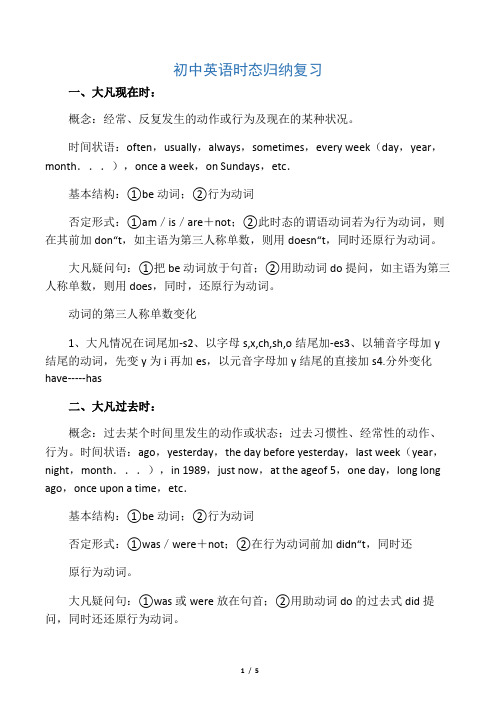
初中英语时态归纳复习一、大凡现在时:概念:经常、反复发生的动作或行为及现在的某种状况。
时间状语:often,usually,always,sometimes,every week(day,year,month...),once a week,on Sundays,etc.基本结构:①be动词;②行为动词否定形式:①am/is/are+not;②此时态的谓语动词若为行为动词,则在其前加don“t,如主语为第三人称单数,则用doesn“t,同时还原行为动词。
大凡疑问句:①把be动词放于句首;②用助动词do提问,如主语为第三人称单数,则用does,同时,还原行为动词。
动词的第三人称单数变化1、大凡情况在词尾加-s2、以字母s,x,ch,sh,o结尾加-es3、以辅音字母加y 结尾的动词,先变y为i再加es,以元音字母加y结尾的直接加s4.分外变化have-----has二、大凡过去时:概念:过去某个时间里发生的动作或状态;过去习惯性、经常性的动作、行为。
时间状语:ago,yesterday,the day before yesterday,last week(year,night,month...),in 1989,just now,at the ageof 5,one day,long long ago,once upon a time,etc.基本结构:①be动词;②行为动词否定形式:①was/were+not;②在行为动词前加didn“t,同时还原行为动词。
大凡疑问句:①was或were放在句首;②用助动词do的过去式did提问,同时还还原行为动词。
动词过去式的变化(1)规则变化1)大凡情况直接+ed如:work-workedplay-played2)以e结尾的词只加-d 如:live-liveddance-danced3)以“辅音字母+y”结尾的词,变y为i再加-ed如:study-studied以元音字母加y结尾的直接加ed如play----played4)以重读闭音节结尾,且末尾只有一个辅音字母的词,先将这个字母双写,再加-ed.如:stop-stoppedplan-planned原行为动词。
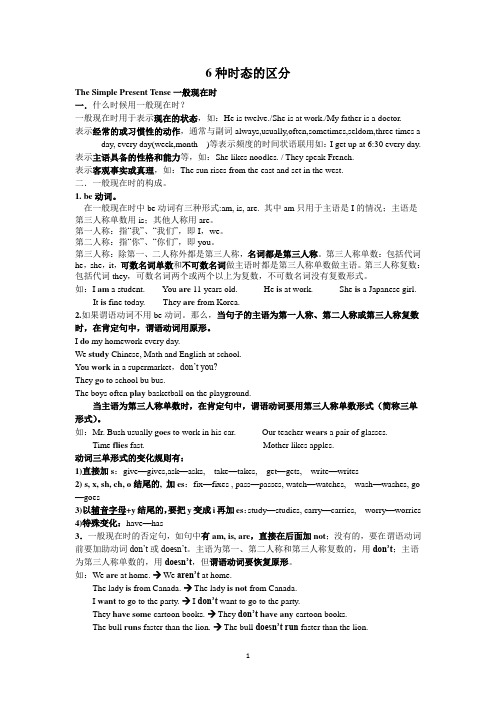
6种时态的区分The Simple Present Tense一般现在时一.什么时候用一般现在时?一般现在时用于表示现在的状态,如:He is twelve./She is at work./My father is a doctor.表示经常的或习惯性的动作,通常与副词always,usually,often,sometimes,seldom,three times a day, every day(week,month---)等表示频度的时间状语联用如:I get up at 6:30 every day. 表示主语具备的性格和能力等,如:She likes noodles. / They speak French.表示客观事实或真理,如:The sun rises from the east and set in the west.二.一般现在时的构成。
1. be动词。
在一般现在时中be动词有三种形式:am, is, are. 其中am只用于主语是I的情况;主语是第三人称单数用is;其他人称用are。
第一人称:指“我”、“我们”,即I,we。
第二人称:指“你”、“你们”,即you。
第三人称:除第一、二人称外都是第三人称,名词都是第三人称。
第三人称单数:包括代词he,she,it,可数名词单数和不可数名词做主语时都是第三人称单数做主语。
第三人称复数:包括代词they,可数名词两个或两个以上为复数,不可数名词没有复数形式。
如:I am a student. You are 11 years old. He is at work. She is a Japanese girl.It is fine today. They are from Korea.2.如果谓语动词不用be动词。
那么,当句子的主语为第一人称、第二人称或第三人称复数时,在肯定句中,谓语动词用原形。
I do my homework every day.We study Chinese, Math and English at school.You work in a supermarket,don’t you?They go to school bu bus.The boys often play basketball on the playground.当主语为第三人称单数时,在肯定句中,谓语动词要用第三人称单数形式(简称三单形式)。
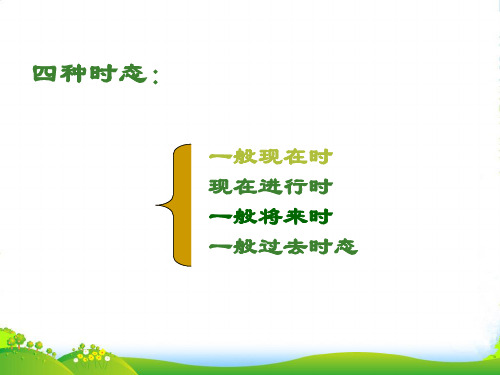

七年级英语外研语法知识点在学习英语过程中,语法是一个非常重要的部分。
在七年级英语课程中,外研版教材涵盖了一些基础的语法知识点。
在本文中,我们将详细介绍这些知识点,以帮助学生更好地掌握英语语法。
一、一般现在时一般现在时是英语中最常见的时态之一,用来描述经常性的动作或状态。
例如:“I play basketball every Sunday”(我每个星期天打篮球)。
一般现在时的构成:主语 + 动词原形(第三人称单数要在动词后加“s”)。
例如:“He plays basketball every Sunday”(他每个星期天打篮球)。
二、一般过去时一般过去时用于描述过去发生的事情。
例如:“Yesterday, Iwent to the zoo”(昨天,我去了动物园)。
一般过去时的构成:主语 + 动词过去式。
例如:“I played basketball yesterday”(我昨天打篮球了)。
三、一般将来时一般将来时用于描述将来的动作或事件。
例如:“I will go to Beijing next week”(下个星期我将去北京)。
一般将来时的构成:主语 + will + 动词原形。
例如:“She will study English tonight”(她今晚要学英语)。
四、现在进行时现在进行时表示正在进行的动作。
例如:“I am watching television now”(我正在看电视)。
现在进行时的构成:主语 + am/is/are + 动词-ing。
例如:“She is studying Chinese now”(她正在学汉语)。
五、过去进行时过去进行时表示在过去某个时间正在进行的动作。
例如:“I was reading a book when my friend called me”(当我的朋友给我打电话的时候,我正在看书)。
过去进行时的构成:主语 + was/were + 动词-ing。
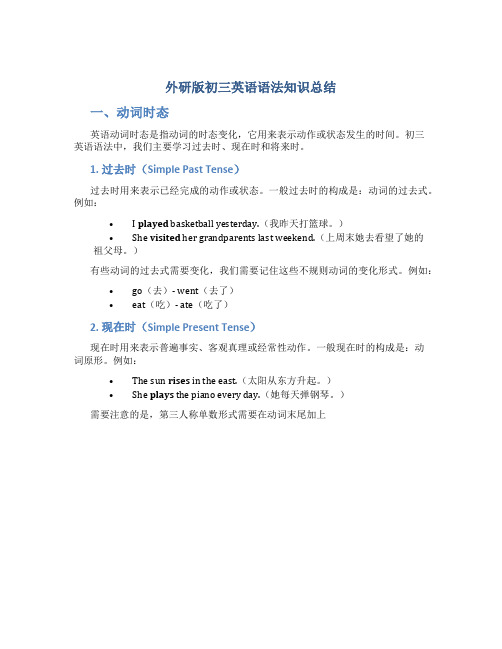
外研版初三英语语法知识总结
一、动词时态
英语动词时态是指动词的时态变化,它用来表示动作或状态发生的时间。
初三
英语语法中,我们主要学习过去时、现在时和将来时。
1. 过去时(Simple Past Tense)
过去时用来表示已经完成的动作或状态。
一般过去时的构成是:动词的过去式。
例如:
•I played basketball yesterday.(我昨天打篮球。
)
•She visited her grandparents last weekend.(上周末她去看望了她的祖父母。
)
有些动词的过去式需要变化,我们需要记住这些不规则动词的变化形式。
例如:
•go(去)- went(去了)
•eat(吃)- ate(吃了)
2. 现在时(Simple Present Tense)
现在时用来表示普遍事实、客观真理或经常性动作。
一般现在时的构成是:动
词原形。
例如:
•The sun rises in the east.(太阳从东方升起。
)
•She plays the piano every day.(她每天弹钢琴。
)
需要注意的是,第三人称单数形式需要在动词末尾加上。

外研版英语英语动词的时态形式讲解含解析一、初中英语动词的时态1.There _____ a football match on TV this evening.A.will have B.is going to be C.has D.is going to have 【答案】B【解析】【分析】【详解】句意:今天晚上电视上将有一场足球赛。
本句时态为将来时,将来时态有两种表达方式,一种是will+动词原形,另一种是be going to+动词原形,本句用到there be 句型,故选B。
2.The life we were used to _______ greatly since 1992.A.change B.have changed C.changing D.has changed【答案】D【解析】试题分析:句意:我们过去的生活自从1992年后有了巨大的变化。
本题需要断句正确,we were used to作句子主语的定语,句子缺少谓语动词,根据时间状语since 1992,可知句子的谓语用现在完成时态,主语是the life 用第三人称has changed,故选D。
考点:考查完成时态的用法。
3.—Do you know _________ the meeting?—Tomorrow morning.A.when they hadB.when they are going to haveC.when did they haveD.when are they going to have【答案】B【解析】【详解】句意:——你知道他们什么时候来开会吗?——明天早上。
此题考查宾语从句,宾语从句要用陈述句语序,C和D是疑问句语序,故排除;根据回答Tomorrow morning可知此句时态是一般将来时,A是一般过去时,B是一般将来时;故选B。
4.If our government pay attention to the safety of food, our health in danger.A.isn’t; is B.doesn’t; will beC.won’t; is D.isn’t; will be【答案】B【解析】【详解】句意:如果我们的政府现在不注意食品安全,我们的健康就会出于危险之中。

八年级上册外研版语法知识点总结在英语学习中,语法是一个非常重要的部分,掌握好语法知识可以帮助我们更好地理解和运用语言。
本篇文章主要汇总了八年级上册外研版英语教材中的语法知识点,希望能够帮助大家更好地学习和记忆。
一、动词时态1. 一般现在时:表示经常性的动作,或者说是客观事实。
例如:I usually get up at 6:00 a.m.2. 现在进行时:表示正在进行的动作。
例如:She is taking a shower now.3. 一般过去时:表示过去发生的事情。
例如:I watched TV yesterday evening.4. 过去进行时:表示过去某一时刻正在进行的动作。
例如:At ten o'clock yesterday evening, I was watching TV.5. 现在完成时:表示动作已经完成,与现在有关。
例如:Ihave finished my homework.6. 过去完成时:表示过去的某个时间点之前已经完成的动作。
例如:I had finished my homework before my mom came back.二、被动语态1. 一般被动语态:使用“be+V-ed”,表示主语是动作的接受者。
例如:The cake was made by my mom.2. 进行时被动语态:使用“be being+V-ed”,表示正在发生的被动动作。
例如:The table is being cleaned by a maid.3. 完成时被动语态:使用“have/has/had+been+V-ed”,表示动作已经完成的被动状态。
例如:The book had been read by me before.三、虚拟语气1. 虚拟语气用于表达非真实的情况,可以包括三种:①与现在事实相反:使用“were+主语”,例如:If I were you, I would buy this dress.②与过去事实相反:使用“had+V-ed”,例如:If I had known the answer, I would have told you.③表达目前可能或愿望:使用“should/would/could+V”,例如:If it should rain, we would stay at home.四、情态动词1. can/could:表示能力或者请求允许。

八年级上册英语重点语法外研版第一节:一般现在时一般现在时是英语中最基本的时态之一,它表示习惯性的动作或者经常发生的动作。
在外研版八年级上册英语教材中,一般现在时的语法知识被重点介绍,学生需要掌握以下几点:1. 第三人称单数动词变化规则:在一般现在时中,第三人称单数形式的动词要在词尾加上-s。
例如:He goes to school by bus every day.2. 动作的频率副词:习惯性的动作或者经常发生的动作通常会使用频率副词来表达。
例如:I always do my homework after school.3. 一般现在时的疑问句和否定句:一般现在时的疑问句和否定句的构成也是学生需要掌握的重点之一。
例如:Does she like playing basketball? She doesn't like playing basketball.通过以上几点内容的学习,学生可以掌握一般现在时的基本用法,能够用简单的英语表达日常生活中的习惯和经常发生的动作。
第二节:比较级和最高级比较级和最高级是英语中用来表示事物在某一方面的大小、程度或者范围的重要语法知识点。
在外研版八年级上册英语教材中,比较级和最高级的用法被重点介绍,学生需要掌握以下几点:1. 比较级的构成规则:在比较级的构成中,一般情况下是在形容词或者副词前加上more或者-er。
例如:She is taller than her sister. The weather is getting colder.2. 最高级的构成规则:在最高级的构成中,一般情况下是在形容词或者副词前加上most或者-est。
例如:She is the tallest girl in the class. This is the most interesting book I have ever read.3. 比较级和最高级的用法:比较级用来进行两者之间的比较,而最高级则表示三者或者三者以上的比较。
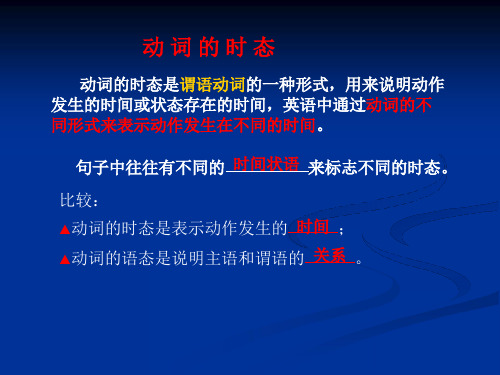
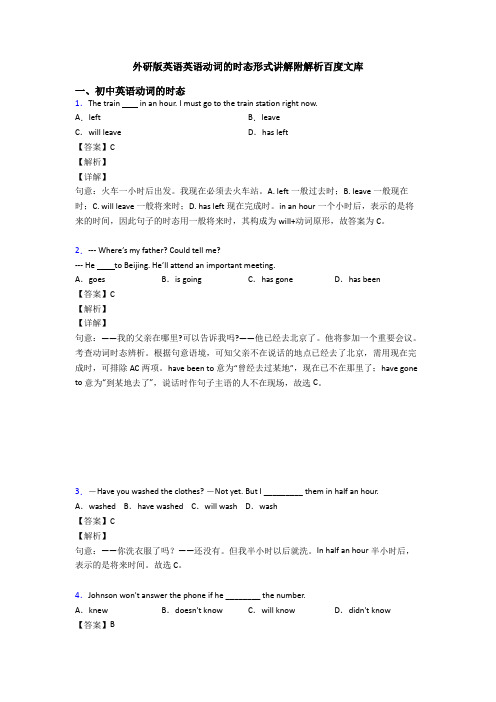
外研版英语英语动词的时态形式讲解附解析百度文库一、初中英语动词的时态1.The train in an hour. I must go to the train station right now.A.left B.leaveC.will leave D.has left【答案】C【解析】【详解】句意:火车一小时后出发。
我现在必须去火车站。
A. left一般过去时;B. leave一般现在时;C. will leave一般将来时;D. has left现在完成时。
in an hour一个小时后,表示的是将来的时间,因此句子的时态用一般将来时,其构成为will+动词原形,故答案为C。
2.--- Where’s my father? Could tell me?--- He to Beijing. He’ll attend an important meeting.A.goes B.is going C.has gone D.has been【答案】C【解析】【详解】句意:——我的父亲在哪里?可以告诉我吗?——他已经去北京了。
他将参加一个重要会议。
考查动词时态辨析。
根据句意语境,可知父亲不在说话的地点已经去了北京,需用现在完成时,可排除AC两项。
have been to意为“曾经去过某地”,现在已不在那里了;have gone to意为“到某地去了”,说话时作句子主语的人不在现场,故选C。
3.-Have you washed the clothes? -Not yet. But I _________ them in half an hour. A.washed B.have washed C.will wash D.wash【答案】C【解析】句意:——你洗衣服了吗?——还没有。
但我半小时以后就洗。
In half an hour半小时后,表示的是将来时间。
故选C。
4.Johnson won't answer the phone if he ________ the number.A.knew B.doesn't know C.will know D.didn't know【答案】B【解析】句意:如果约翰逊不知道电话号码,他就不接电话。